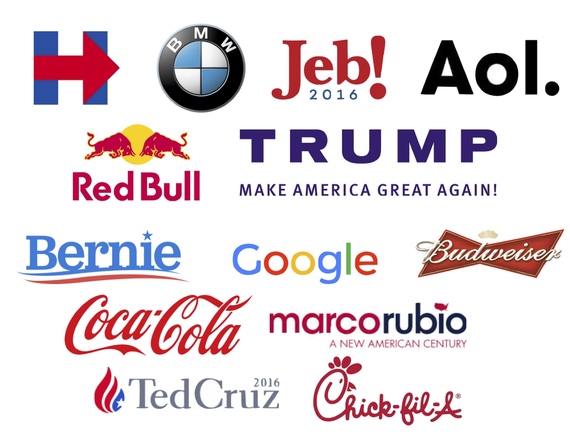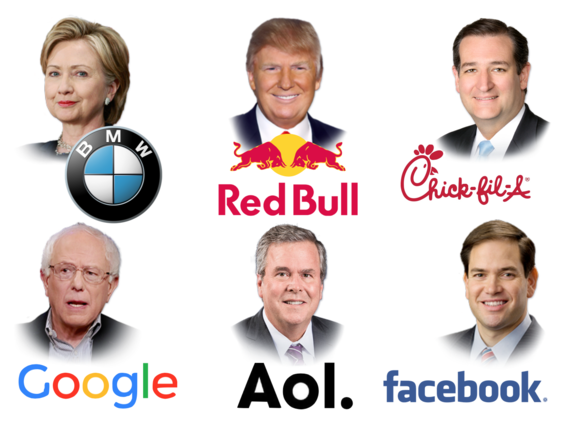Consumers are interesting creatures. Having spent my career as a branding professional figuring out how to get into the heads of consumers I can say this with great authority. Once you do get into their heads, you'll find, in addition to myriad things physiological and emotional, millions of brands.
That's because brands are nothing more than a collection of associations established and embedded over time. The strongest brands have associations that are rich and evocative and give consumers a simple way to differentiate one product or service from another.
In the recent Presidential Branding Study I conducted with Douglas Schoen, a leading market research professional and campaign consultant, we had a sense that using brand associations to help consumers differentiate one political candidate from another might be an interesting way to get their defenses down enabling them to better articulate their honest feelings. Better and more reliable than just asking them directly, "So, who do you like, and why."
Our instincts were right. Rather than simply giving us the canned answers they thought we'd want to hear, using brands to define the political candidates allowed our survey subjects to express themselves more freely, more viscerally, and in a much more articulate manner. Their answers, based on all those embedded brand images and associations, were robust and candid and very telling.
That said, as the brand guy on the survey team, I'd like to share what their answers were telling me relative to consumer sentiment about the front-running candidates for president, followed by an assessment of what I'd tell these candidates relative to what it might take to become the winning presidential brand.
As context, in the survey we asked respondents which brand, from among a list of brands in a variety of categories, they associated with a specific candidate. The categories ranged from beverages and fast food, to automobiles and hotels, to technology and media, even fictional characters.
Donald Trump Top Brand Associations:
Red Bull
Hummer
Mercedes
Blackberry
Goldman Sachs
Ritz Carlton
Business week
Twitter
Hulk
Two dimensions emerge -- the bold, adventuresome challenger, daring and not caring if he's ruffling feathers. And the no-nonsense, wealthy businessman, proud of his success with nary an apology for it, or anything else.
My assessment? Strong brands are focused relative to what they stand for. Trump may have too narrow a focus, classifying him as a "niche brand." To be a presidential brand, he must broaden his appeal -- without losing the core attributes that define him. He can't risk getting fuzzy. This is a tough situation for any brand. How do you remain true to who you are yet evolve to meet market conditions?
Hillary Clinton Top Brand Associations:
Stella Artois
Panera
BMW
IPhone
Martha Stewart Living
Chobani
Saks Fifth Avenue
An interesting mix. Respondents see her as a worldly, sophisticated lady, clearly upscale and urbane, with a dash of the progressive and purpose-driven. They most likely link these associations to her time as First Lady and Secretary of State and, as for Martha Stewart, as her role as a mother and grandmother.
As I said, an interesting mix, which could pose a problem. As opposed to Trump (no pun intended), she needs to more clearly define her focus. She needs to identify one distinct image and make it her own through her words and actions.
Jeb Bush Top Brand Associations:
Hilton
AOL
Sears
Bud Light
Flip Phone
Coke
Maxwell House
BMW
Jeb Bush. In ad-speak, as much as he's trying not to be his father's Oldsmobile or anything else associated with the family name, most of his brand associations are old-school, dated, and non-progressive. All in all, he's associated with brands that have lost their edge. My opinion is that he's got to connect to more vibrant, thriving imagery to revitalize his campaign.
Ted Cruz Top Brand Associations:
Budweiser
Coke
Holiday inn
Chick-Fil-A
Mercedes
Gun & Ammo
These brands say that, like Trump, he's got a very focused image, perhaps skewing a little southern. And, that, like Trump, he's going to have to broaden his appeal to win votes nationally.
Marco Rubio's Top Brand Associations:
Corona
Chick-Fil-A
Holiday Inn
Wall Mart
Starbucks
These brands indicate a younger more mainstream image linked to his Hispanic heritage. The rest of respondents' choices are all over the map. Like Clinton, this means no single image has developed around which he can communicate a focused and consistent story.
So, what would I tell these contenders about brand strategy?
First, find your focus, a single-minded and compelling idea that is different in a way people care about. Trump, and possibly Cruz, are the only candidates so far who have done this, but their focus is too narrow.
Once you've found your focus, communicate your message consistently. Sure, it's normal to want to make this group and then that group happy, but we all know flip-flop is not a pathway to success. Bottom line: To be a winning brand you must stand for something unique that is relevant to the most consumers possible and deliver as promised.
Easier said than done.

